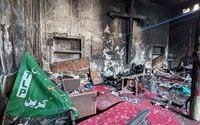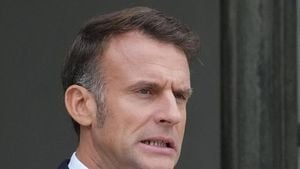Lahore, one of Pakistan’s most populous cities, was plunged into chaos on the night of October 8, 2025, as violent clashes erupted between Punjab Police and supporters of the hardline religious group Tehreek-e-Labaik Pakistan (TLP). According to multiple reports from News Intervention and News18, the confrontation began when police forces moved to seal the TLP headquarters in the city’s Iqbal Town area, a move that was met with fierce resistance from party supporters.
The situation quickly spiraled out of control. Eyewitnesses described scenes of pandemonium as police fired teargas and shells into crowds of demonstrators, who retaliated with stones, makeshift barricades, and even iron rods. Videos circulating on social media showed groups of men running through smoke-filled streets, some clutching spent tear-gas canisters and chanting slogans denouncing police brutality. The air was thick with tension, and according to News Intervention, both sides suffered injuries, though no official casualty figures were released as of October 9.
The spark for this latest round of unrest was a planned protest by TLP. Just hours before the crackdown, the group—led by radical cleric Saad Hussain Rizvi—had announced its intention to stage a massive demonstration outside the US Embassy in Islamabad following Friday prayers on October 10. The protest was called in opposition to the so-called Gaza Deal, which TLP claims is backed by Western powers, particularly the United States, and amounts to a betrayal of the Palestinian cause. The group accuses the Pakistani establishment of recognizing Israel and colluding against the people of Gaza, allegations that have only fueled the fervor of its supporters.
As police attempted to arrest Saad Rizvi and other senior TLP leaders in Lahore and Islamabad, the confrontation escalated. According to News Intervention, the police operation was designed to prevent “unlawful gatherings and incitement to violence.” However, TLP representatives saw things very differently. In statements released early Thursday, the party condemned what it called “state repression and religious persecution,” alleging that police had raided the homes of its supporters, sometimes detaining female family members and even infants when activists could not be found. The party’s spokesperson described these actions as “the worst form of state-sponsored terrorism,” vowing to continue the movement against “the establishment’s betrayal of Islam and the people of Palestine.”
The crackdown did little to quell the unrest. If anything, it galvanized TLP’s base. In response to the arrests and raids, the group called for a large-scale sit-in in Islamabad, with thousands expected to mobilize from Punjab and other provinces. TLP also demanded the immediate release of Saad Rizvi, stating that negotiations with the Punjab government would only begin once their leader was freed. Social media channels affiliated with TLP buzzed with calls for further demonstrations, and by Thursday morning, security forces had reinforced their presence around Lahore in anticipation of more trouble.
The government, for its part, was taking no chances. Security agencies declared a high alert in Islamabad, focusing particularly on the Red Zone—a district that houses key government institutions and foreign embassies, including the US Embassy. Law enforcement officials warned that any attempt by TLP supporters to breach the Red Zone or approach diplomatic missions would be met with a “strong and immediate response.” According to News18, authorities urged restraint from all sides, but made it clear that they were prepared to act firmly to maintain order.
The unrest in Lahore is only the latest episode in a long history of confrontations between TLP and Pakistani law enforcement. The group, which espouses a hardline Barelvi Islamist ideology, has built a reputation for its street power and vocal opposition to both Western influence and perceived government betrayals on religious and foreign policy issues. In past years, TLP has organized massive protests over blasphemy-related controversies and diplomatic disputes, often resulting in prolonged standoffs with police and widespread disruption.
Saad Rizvi, the group’s current leader, has himself been detained multiple times for organizing violent protests and blocking national highways. His most recent arrest, alongside the detention of senior figure Naeem Chatha in Islamabad and the roundup of dozens of local leaders across Punjab, was intended to disrupt TLP’s plans for the protest march. Yet history suggests that such crackdowns often have the opposite effect, emboldening the group’s supporters and drawing even larger crowds into the streets.
Human rights observers and political commentators have expressed concern over the government’s approach. According to News Intervention, the recurring crackdowns on religious parties and dissenting voices reflect a broader trend of intolerance toward opposition in Pakistan, especially as the country faces mounting internal unrest and international scrutiny over its stance on the Middle East conflict. The TLP’s accusations of “excessive use of force” and the targeting of families have only intensified the debate over civil liberties and state power.
For ordinary residents of Lahore, the night of October 8 was one of fear and uncertainty. “It was like a war zone,” one eyewitness told News18, describing how the sounds of explosions and shouting echoed through the city’s streets. Local businesses shuttered early, and many families huddled indoors, waiting for the violence to subside. Meanwhile, police sources reported that at least three constables were injured after being attacked by protesters wielding iron rods—a reminder that the violence cut both ways.
As Friday prayers approached, all eyes turned to Islamabad, where the next phase of the standoff was set to unfold. With thousands of TLP supporters expected to descend on the capital, authorities braced for further unrest. The government’s warnings were clear, but so too was the determination of TLP’s base, who saw their protest as a “decisive stand against the betrayal of Gaza.”
Amid the uncertainty, one thing was certain: the events in Lahore had thrown Pakistan’s simmering tensions into sharp relief. The coming days would test the government’s ability to balance security with civil liberties—and the resolve of a movement that has repeatedly shown its willingness to confront the state head-on.
As the dust settles in Lahore, Pakistan faces difficult questions about dissent, religious politics, and its place in a region wracked by conflict and shifting alliances. The echoes of this week’s clashes are likely to reverberate for some time to come.




